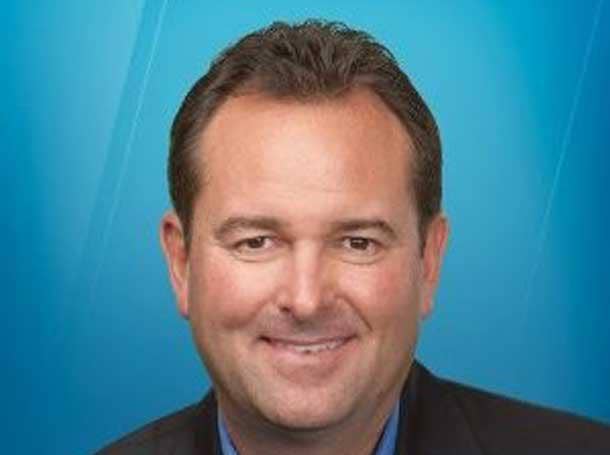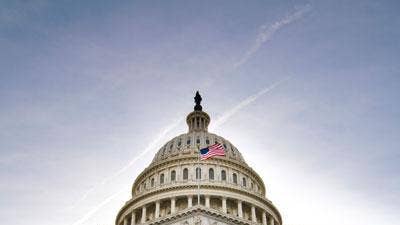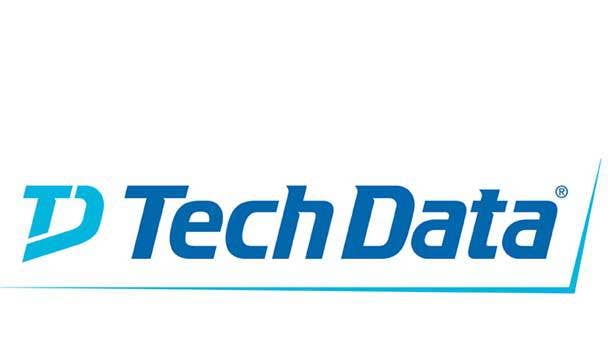Joe Quaglia On How Tech Data And DLT Solutions Will Conquer The Public Sector
‘We think Tech Data is underpenetrated in a very large, multibillion-dollar market,’ says Quaglia, president of the Americas for Tech Data. ‘The federal public sector space is $43 billion. And we think there’s a huge opportunity for us to capture some market share.’

A Force To Be Reckoned With
Tech Data moved into the U.S. federal government space in a big way Wednesday with the acquisition of Herndon, Va.-based DLT Solutions, No. 42 on the 2019 CRN Solution Provider 500.
The deal will marry DLT’s robust federal contract vehicles and community of systems integrators (SIs) with deep expertise serving U.S. government and agencies with Tech Data’s more SLED-oreiented (state, local and education) public sector community. The transaction also will make it possible for Tech Data to get SIs involved with commercial customers for the first time.
Tech Data President, Americas Joe Quaglia spoke with CRN about DLT Solutions’ big bets around next-generation technologies, the strength of its federal contract vehicles, and how the distributor plans to avoid channel conflict going forward.
Read on to get Quaglia’s take on how the Tech Data-DLT Solutions deal came together, how DLT Solutions works with channel partners today, and how the combined company plans to complete and win against Ingram Micro and Arrow in the U.S. government space.

How big of a slice of the Americas pie do you see the U.S. government being for Tech Data going forward?
I think I want to reserve on that. I'm going to refrain from numbers. Because we're two separate companies right now, I don't want to disclose too much.
Without getting into numbers, do you see the U.S. government as a significant piece of your go-forward strategy?
Obviously, when you look at M&A, and when you start to put investments together, whether that be organic or inorganic, we always look at the market space. And we think Tech Data is underpenetrated in a very large, multibillion-dollar market. The federal public sector space is $43 billion. And we think that there's a huge opportunity for us to capture some market share, as well as bring the Tech Data and DLT value propositions, portfolio, expertise and execution into that space to help our channel partners succeed even more.

What type of access does DLT have to contract vehicles, and why is that so important for you?
Our government contract strategy continues to be partner-led, which means that we're going to focus on continuing to use our partners’ contracts as the best and first option for pursuing government business. We're also going to be using our contract exchange program to link partners with contracts to those that are in need of contracts, and then obtain government contracts that allow us to partner with teaming agents, and then finally securing government contracts on behalf of partners that are pursuing business with the government. And so where Tech Data adds value gets combined with even the stronger value proposition that DLT has there. We have a number of ways in which we can partner with our vendor community, as well as with our reseller community to maximize the benefit of many of these contract vehicles.

How can the combination of DLT Solutions and Tech Data help your channel partners secure U.S. federal contracts?
It really falls into four dimensions. So No. 1, continuing to use our partners' contracts. Partners have contracts, and that's the best and first option for pursuing government business. Think of it as the partner community has a contract, and our ability is to help them navigate that, compete for business, bring skills to the game, and help them win. That's first and foremost what Tech Data and DLT do very well in our independent businesses. But it's also using our contracts and our ability to exchange those programs and link them with the partner community who may not have those contracts but are in need of leveraging these contracts. We can bring that to them. And then, obviously, continuing to obtain government contracts on our own that allow for us to partner with teaming agents and others within the ecosystem so that we can extend the value of our contracts out to the channel. And then finally, securing more government contracts on the behalf of the partners that like to pursue the business with the federal government. So I think there's multiple dimensions to how the contract vehicles, whether they're owned and run by our channel community, or whether they're owned by Tech Data and DLT, we have an opportunity to really extend that value now, on top of leveraging the talent, the skills and the people that we can bring under one umbrella. It becomes a really cool value proposition.

How typical or atypical is it today for Tech Data channel partners to own the federal government contracts?
There are a number of partners that have contract vehicles for sure. Tech Data did not have a number of contract vehicles in our legacy business, which was obviously one of the reasons for the pursuit with DLT. And so when you have DLT with a multitude of contract vehicles, it really creates a unique opportunity to leverage those with our partner community both on the vendor side as well as with our channel partners.
What contract vehicles is DLT bringing to the table, and what are they adding beyond what Tech Data had already?
I wish I could go into more detail, but unfortunately, I can't. Obviously, we're continuing to be two separate companies, and let's kind of leave it at that.
Is DLT Solutions more civilian-focused or more military-focused? Where's their strength within the U.S. government?
I can't really go into details about the specifics around DLT simply because we don't own them yet. We're two separate companies.

What categories of next-generation technology is DLT particularly strong in?
DLT has consistently provided a really robust network of partners and broad portfolio. What's really exciting is that their expertise over the last two or three years has really focused on six key technology domains: application life cycle; big data and analytics; business applications; cloud computing; cybersecurity; and IT infrastructure. So, in short, the acquisition enables Tech Data to proactively develop opportunities for channel partners serving these categories. With our expertise and our talent in the public sector space, it gets really exciting.
How much investment has DLT made in those next-generation technology areas over the past two or three years?
What was really attractive is that, when Art Richer came in as CEO three or four years ago, he made a commitment to pivot the company more toward that next generation, more toward recurring revenue, cloud-based and subscription-based, and the majority of the revenue is built around software and cloud in that recurring model, which is obviously where the next generation is headed, if not already there today. And so Art made the decision to pivot the company, and made a significant amount of investments in hiring the talent, as well as repositioning the portfolio. Quite honestly, when you look at their portfolio, there's a lot of synergies between our portfolio of end-to-end solutions and their portfolio of end-to-end solutions, and I think they're very complementary in our ability to join forces and bring in even better solutions aggregation to the market and to our channel partners simply from a portfolio perspective. So it gets really exciting when you look at the two.

To what extent does DLT Solutions work through other channel partners in serving government agencies today?
I mean, specifically, they have, very similar to Tech Data, vendor partners and channel partners. They even work with systems integrators, which I think is a great opportunity for Tech Data as well. They're all partner-led. And so, the way that they serve their market and their channel is very purposeful around those contracts, whether they be teaming agreements with the channel partners, whether they're leveraging the OEM's contracts, or whether the channel is actually using DLT's contracts. It's a great way to get an opportunity to push and move more business in the public sector space through those vehicles, and DLT is in the center of that ecosystem.
Does DLT Solutions work directly with government agencies themselves, or do all their interactions with the public sector today go through channel partners?
All through channel partners. And I would say, because of that federal space, very similar to other competitors, they do bring in the government agencies. But that's on the behalf of the channel partner in working closely with the channel partner.
Why is DLT Solutions bringing in government agencies themselves?
When you talk about how you’ve got to leverage those contract vehicles, and when you're building solutions and partnering with a channel partner, they have to work closely with the government agencies as they aggregate those solutions. But they're not leading into the end-user agency, they're working first with channel partners.

How similar or dissimilar is the DLT Solutions channel community to the Tech Data channel community?
What's really exciting is that there's a lot of complementary synergies between the channel partner community of DLT and that of Tech Data. And what's even more exciting is that, for those channel partners that are customers of both, we actually get to combine the organizations that offer more value to those channel partners as they grow their business in the public sector. And then we have opportunities like I mentioned in the SI community where DLT is very strong, but Tech Data has not really had a channel with the Sis. And I think it's an opportunity to expand and extend the Tech Data value proposition with DLT into those types of partners that really didn't have a relationship, per se, with Tech Data. So I think there's some exciting opportunities, some great synergies there.

Are you hoping to sell some of some of your commercial products and services through SIs, or will the SI relationship be mostly focused on government?
Oh no, it actually gives us an opportunity to extend it well beyond the public sector space. And I think that's a great opportunity where the benefits of DLT and the benefits of Tech Data can combine not only to continue to strengthen that value proposition for our channel partners in the public sector space, but also to take the benefits of that combination and bring it into the commercial space as well. So, lots of opportunities, sort of bi-directional, but we think that there's plenty of opportunity for both companies once we put the two together and create that value proposition.
How significant then is it for Tech Data to get SIs potentially into that commercial space?
Well, I think there's just great upside there. Obviously, when you can open up another channel of channel partners that represent a really nice piece within the public sector space but also in the commercial space, I think any time you do that there's potential for some really good upside.

How much partner overlap is there between DLT Solutions and Tech Data, and what's the profile of those overlapping partners?
When we started to do the research and we started to have the discussions, what was really interesting is that there's a significant differentiation between the makeup of our channel partners and their channel partners. But what's even more interesting, as we started to do the research, is that channel partners that exist within both organizations have been excited about the potential to bring two companies together that can offer even greater value as they continue to penetrate and grow the public sector space. I think that, for those that exist on both sides, there's plenty of opportunity for us to share this value proposition with them for their continued growth in the public sector space.
What are the key differences between the Tech Data partner community and the DLT Solutions partner community today?
I can tell you that when you're competing in the public sector space, our partners have leveraged us for our size, strength, financial capability, and our skill set associated with the federal and, in large part, the state and local, while DLT's customers are primarily focused really on that federal space, especially around some of those federal contracts. So when you think about the strengths of the partner community for both, and you're able to put both federal and state, local and education together, and the strengths of the two, it really becomes kind of interesting.

What's the level of interest or demand from your state, local and education partners today to get into the U.S. federal space?
There's actually a lot of overlap. In fact, you know there are some partners that all they do is focus primarily on state and local, and we serve them very purposely in that particular domain. Obviously, that's very different from serving the federal. We obviously have quite a few partners that serve the entire public sector market, but I think when you start to put this value proposition together, you can quickly see that when you have skills from two companies that have deep domain knowledge in both federal and state and local, we now have the opportunity to help enable the partner community to compete in both domains and help them expand their business in the entire public sector space. So we think it's kind of exciting for us to be able to do that.

Does DLT Solutions have a lot of pure-play U.S. federal government partners, or do their partners tend to have broader portfolios that happen to include the U.S. federal government?
They're both. But as you can imagine, some of the bigger partners have very big divisions centered specifically around the federal space. So you've got really large, enterprise-class partners that do both commercial and federal. And then you have a large number of partners that focus just on the public sector space. So I think you have a diversity of quite a few partners that focus on both commercial and just federal.
Do you have a sense of roughly how many channel partners DLT is bringing to the table?
I can't provide any details on the numbers again until the deal closes, but once we get to that stage, we'll be able to come back together and give you a little bit more detail.
Are the terms of the deal being publicly disclosed?
We're not sharing that publicly.
For your channel partners today that are just commercial or just do state, local and education, what are the biggest differences for them about serving federal government customers?
I think it's the complexity of those contract vehicles. And we can bring staff in that's skilled and bring processes in that have been in place for years and are bulletproof. Now we can take that value proposition of what DLT has done all their lives and what they're very good at and extend that into a larger portion of the market, whether that be the existing Tech Data public sector customer reseller or the commercial reseller. The ability to bring simplicity to something that's extremely complex that requires talent, skills, process and IT systems, we think that's a huge opportunity for our Tech Data legacy customers.

How did the deal with DLT Solutions came together?
A lot of it is built on our strategy around free cash flow, whether it be share repurchases, organic investments or select M&A. And then you think about our strategy of delivering higher value, especially around portfolio expansion, and next-generation technologies. And then you think about where we sit within the public sector space, it only made sense for us to look deeper into that category and that vertical and figure out, ‘Is there a way for us to add more value?’ especially when you think about the public sector space being a $43 billion market projected to add value. And when we connected with the folks at the DLT, we started to have a dialogue, and we started to think about, 'How do you put the benefits of two companies together to add more value to our mutual channel partners?' It became real, and so we just developed it over a number of months, and we're able to put together a really, really nice value proposition with the announcement we made today.

I know historically that U.S. federal is a space that Tech Data hasn't played much in. What led to the change of mind here?
Well, we actually have been a player. We probably have been more of a quiet player. It's actually a pretty relevant business at Tech Data. But when we thought about how we were going to eventually be more aggressive in the space and compete and bring more value, it really came down to having the skills as well as the ability to obtain the contract vehicles and be able to manage those contract vehicles to create more simplicity and take some of the complexity out of them for the channel community. We decided that some time ago, in order for us to do that, it likely was going to have to come through some form of a partnership. And so we were obviously just waiting for the right opportunity, and when DLT came along, we thought it was the perfect match.

What do you feel is going to be your differentiator against Ingram Micro and Arrow in the U.S. public sector space going forward?
I think it comes down to three or four things. And this is where I think the value proposition of DLT and Tech Data are going to put us in a differentiated state. No. 1, it comes down to the talent, the skills and the people. I think the combination of the Tech Data talent and the DLT talent puts us in a perfect position to offer even more value to our mutual channel partners. Second, it's about the portfolio and our ability to aggregate that portfolio on behalf of our channel partners. And when you think about Tech Data's stated strategy of next-generation capabilities, DLT offers the majority of their portfolio in the next-generation categories. And so that combination fits really well in terms of our investments in moving to next-gen and DLT's position in the public sector and next-gen markets. I also think that they're one of the strongest players when it comes to the contract vehicles. Their ability to manage them, their ability to obtain them, and their ability to leverage them through the partner community I think is second to none. And then in the end, I think it just comes down to execution. And as you know, Tech Data has been an execution engine. That's our DNA. DLT has the same DNA in serving the public sector, and so when you put the two together I think we're going to be a real value-add to our channel community in terms of executing on their behalf and bringing a better game, and perhaps a more competitive game to their business.

What are you hoping to do to leverage the strength of DLT Solutions post-close?
First and foremost, DLT strengthens Tech Data's next-generation technology solutions portfolio and capability, and will extend our Tech Data public sector IT market presence. And obviously, the acquisition enables us to proactively develop opportunities for channel partners, both mutual and exclusive in the public sector space, which accelerates our growth. It allows us to simplify the complexity with deeper specialization in that space. So those are sort of the two key areas that we're going to be focused on as we work toward close, and then work toward integrating the two companies.
Are you planning to keep DLT Solutions as a stand-alone operation focused on the public sector, or are there plans to more tightly integrate it into Tech Data?
I'd like to reserve answering that until we get to close. I really can't enter into discussions about future integration until the deal is actually complete.
Specifically, do you know if you're planning to keep the DLT brand, or is that still to be determined?
We just can't enter into discussions about the future. We're still two separate businesses, and we're going to continue to operate that way until the deal closes.
From a personnel standpoint, is the plan for Art Richer and other members of the DLT executive team to stay on board?
I really can't talk about the future integration. I will tell you that one of the key value propositions is the talent at DLT, and we're really excited about the team joining Tech Data. And once we get to close of the transaction, we'll be able to talk in a little bit more detail.

Is there anything else you want the Tech Data channel community to know about the acquisition?
Partners are going to ask, and we've talked to some already—this is all about enhancing and enabling our current channel partner community, as well as DLT's channel partner community, to help them grow their business within the public sector space. And then, obviously, commercial customers have the opportunity to leverage the benefits of both portfolios. So I think this is a great opportunity for our channel community. And we continue to focus on being partner-led, and nothing will change there, so we're really excited about the opportunity.